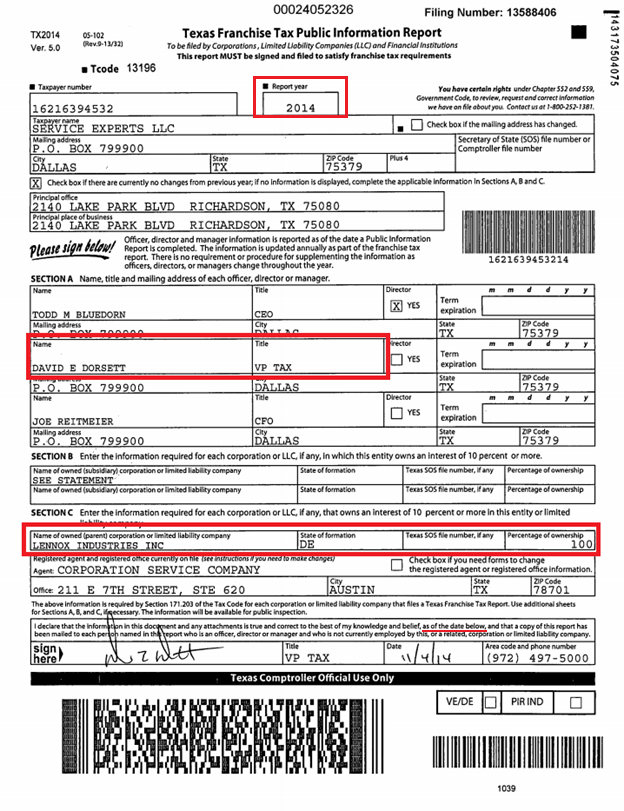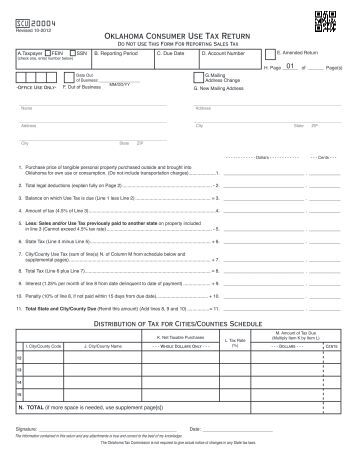
Your Texas LLC won’t have to pay franchise tax if either of the following are true:
- your LLC’s annualized total revenue for the tax year is below the “ No Tax Due Threshold “
- and your LLC’s calculated tax liability is less than $1,000
Who has to pay Texas franchise tax?
Franchise tax taxes all the businesses involved in the process from the manufacturer to the end distributor. It can be considered a tax for the privilege of doing business in Texas. Who Needs to File for Texas Franchise Tax? The short answer is everyone who has nexus in Texas has to file & pay Texas franchise tax.
How to fill out franchise tax form in Texas?
To successfully file your Texas Franchise Tax Report, you’ll need to complete these steps:
- Determine your due date and filing fees.
- Complete the report online OR download a paper form.
- Submit your report to the Texas Comptroller of Public Accounts.
Are franchise fees taxable in Texas?
Tax vs. Fees – thin Texas and the 5 Judicial Circuit 5th Circuit Court of Appeals held that Cable franchise fees are “FEES,” NOT TAXES Franchise fees are not a tax, however, but essentially a form of rent or fee: the price or fee paid to rent use of public right-of-ways. See, e.g., City of St. Louis v.
What is the Texas franchise tax rate?
The franchise tax of wholesale and retail companies is 0.5 percent regardless of the size of the business. A business earning an annual revenue of $10 million or less pay 0.575 percent when using the state's E-Z Computation form.

Does an LLC have to file a Texas franchise tax return?
Each taxable entity formed in Texas or doing business in Texas must file and pay franchise tax.
Do single member LLCs pay franchise tax in Texas?
Therefore, each taxable entity that is organized in Texas or doing business in Texas is subject to franchise tax, even if it is treated as a disregarded entity for federal income tax purposes and is required to file a franchise tax report.
Who is exempt from Texas franchise tax?
A nonprofit corporation organized under the Development Corporation Act of 1979 (Article 5190.6, Vernon's Texas Civil Statutes) is exempt from franchise and sales taxes. The sales tax exemption does not apply to the purchase of an item that is a project or part of a project that the corporation leases, sells or lends.
What happens if an LLC does not pay Texas state franchise taxes?
In Texas, failure to file your franchise tax returns or pay your franchise tax liability will cause you to lose your limited liability protection. The Texas Tax Code provides for personal liability for the management of a company if there is a failure to file a report or pay a tax or penalty.
What taxes does an LLC pay in Texas?
The two types of business taxes for an LLC in Texas are sales tax and the Texas franchise tax. All businesses are subject to sales tax.
How much is franchise tax for LLC in Texas?
Tax Rates, Thresholds and Deduction LimitsItemAmountTax Rate (retail or wholesale)0.375%Tax Rate (other than retail or wholesale)0.75%Compensation Deduction Limit$370,000EZ Computation Total Revenue Threshold$20 million2 more rows
Who must pay franchise tax in Texas?
The Texas Franchise Tax is calculated on a company's margin for all entities with revenues above $1,230,000. The margin's threshold is subject to change each year.
What is Texas franchise tax based on?
Total revenue for Texas franchise tax is calculated based upon the Internal Revenue Code (IRC) of 1986 in effect for the federal tax year beginning on Jan. 1, 2007, not including any changes made by federal law after that date, and any regulations adopted under that code applicable to that period.
What is the Texas franchise tax threshold for 2022?
$1,230,000For the 2022 report year, a passive entity as defined in Texas Tax Code Section 171.0003; an entity that has total annualized revenue less than or equal to the no tax due threshold of $1,230,000; an entity that has zero Texas gross receipts; an entity that is a Real Estate Investment Trust (REIT) meeting the ...
How do I know how much franchise tax I owe in Texas?
The Texas franchise tax calculation is based on margin, which can be calculated using one of the following methods: Total revenue times 70% Total revenue minus cost of goods sold (COGS) Total revenue minus compensation.
How much does it cost to file a Texas franchise tax report?
How much does the Texas annual franchise tax report cost? There is no filing fee for your franchise tax report. The only payment due is any franchise tax owed for that filing year, plus a $1 service fee for online payments.
What is considered a passive entity for Texas franchise tax?
To qualify as a passive entity, the entity must be a partnership or trust, other than a business trust, for the entire accounting period on which the tax is based.
What is a disregarded entity for Texas franchise tax?
Disregarded Entities Therefore, partnerships, LLCs and other entities that are disregarded for federal income tax purposes are considered separate legal entities for franchise tax reporting purposes. The separate entity is responsible for filing its own franchise tax report unless it is a member of a combined group.
What is the annual fee for an LLC in Texas?
Texas LLC Certificate of Formation ($300) The fee for a mail filing is $300 and the fee for an online filing is $308. The filing fee is a one-time fee. You don't have to pay any monthly (or annual) fees to maintain your Texas LLC.
Can a single person form an LLC in Texas?
Like many states, Texas allows for the formation of single member LLCs, and in fact, these entities are extremely common in this state. The IRS considers a single member LLC to be a disregarded entity. Essentially, this means that single member LLCs are taxed in the same way as sole proprietorships.
Is a single member LLC A passive entity in Texas?
LLCs and S-corps cannot qualify as passive entities, even if 90% of their income is from qualifying passive sources.
What is franchise tax in Texas?
In Texas, the business tax is called the franchise tax. Businesses that are obligated to pay it are capped at 1% of income, which is much lower than the state income tax in many places.
How are LLCs treated?
LLCs are treated federally as one of the other kinds of business entities, depending on how they are filed. An LLC owned by one person treats its income as the personal income of its owner through a process called “pass-through,” leaving the owner to pay the federal self-employment tax themselves. But an incorporated LLC instead pays a corporate tax rate on its profits and then pays taxes again on the income paid out to its shareholders. An S Corporation filing lets the income “pass-through” to the shareholders instead, but puts severe limitations on who is allowed to own stock and what forms that stock can take. This is designed to keep the business small and American.
Why do people work in Texas?
The labor participation rate and total payroll are high. This is mainly due to low-income taxes in the state, which encourages businesses to settle there and is appealing to top talent looking for firms to work for. In Texas, the business tax is called the franchise tax. Businesses that are obligated to pay it are capped at 1% of income, which is much lower than the state income tax in many places.
Does Texas require LLCs to send annual reports?
Texas does not ask its LLCs to send in annual reports to the Secretary of State, instead of folding the purpose of that report into the yearly franchise tax report system.
Is LLC taxed in Texas?
LLC taxes in Texas are, like most of the rest of the laws governing business in the state, very favorable to companies that do business there. LLCs, or limited liability companies, are legal entities that are filed at the state level with special protections when it comes to liability.
What is franchise tax?
Franchise tax is based on a taxable entity’s margin. Unless a taxable entity qualifies and chooses to file using the EZ computation, the tax base is the taxable entity’s margin and is computed in one of the following ways:
How much is the penalty for filing franchise tax return?
You can file your franchise tax report, or request an extension of time to file, online. There is a $50 penalty for a franchise tax report filed after the due date, even if no tax is due with that report and even if the taxpayer subsequently files the report.
What are the benefits provided to all personnel to the extent deductible for federal income tax purposes?
benefits provided to all personnel to the extent deductible for federal income tax purposes, including workers’ compensation, health care and retirement benefits.
How is margin apportioned in Texas?
Margin is apportioned to Texas using a single-factor apportionment formula based on gross receipts.
When are franchise tax reports due?
Franchise tax reports are due on May 15 each year. If May 15 falls on a Saturday, Sunday or legal holiday, the next business day becomes the due date. The Comptroller’s office will tentatively grant an extension of time to file a franchise tax report upon timely receipt of the appropriate form.
Do you have to file franchise tax in Texas?
Each taxable entity formed in Texas or doing business in Texas must file and pay franchise tax. These entities include:
What is franchise tax in Texas?
The Texas franchise tax is a privilege tax imposed on each taxable entity formed or organized in Texas or doing business in Texas.
When are Texas franchise tax returns due 2021?
Due to statewide inclement weather in February 2021, the Texas Comptroller of Public Accounts is automatically extending the due date for 2021 Texas franchise tax reports to June 15, 2021, consistent with the Internal Revenue Service (IRS). See Comptroller Hegar’s press release.
How much is the penalty for filing taxes after the due date?
Penalties and Interest. A $50 penalty is assessed on each report filed after the due date. If tax is paid 1-30 days after the due date, a 5 percent penalty is assessed. If tax is paid over 30 days after the due date, a 10 percent penalty is assessed.
Do franchise tax filers get a reminder?
Most franchise tax filers will receive an email in lieu of a mailed reminder to file or seek an extension. If we do not have your email address on file (if you are a first-year filer, for example), we will mail a reminder notice to you.
